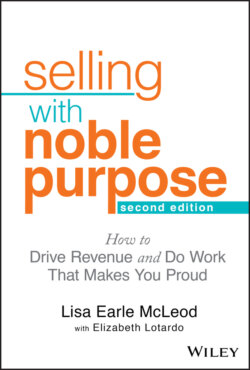Читать книгу Selling With Noble Purpose - McLeod Lisa Earle, Lisa Earle McLeod - Страница 12
How Noble Purpose Plays Out
ОглавлениеImagine two salespeople. They're both waiting in the lobby to meet with a customer. One salesperson has been told by his boss, “Your purpose is to close deals.” The other salesperson believes her Noble Purpose is to improve the customer's business.
Which salesperson is going to ask better questions and uncover more customer intelligence: the seller focused on the deal, or the seller focused on the customer? Which rep is going to be more innovative and engaging: the seller focused on the single transaction, or the seller focused on improving the client's business?
Now let's put you into this scenario. Imagine you're the customer. Which salesperson would you rather have calling on you: the one sitting in the lobby thinking about his deal? Or the one sitting in the lobby thinking about helping you?
The answer is obvious. Customers would rather buy from a salesperson whose purpose is to help them than a salesperson who is only trying to close them.
Organizations have tried for decades to get sales teams to be more consultative and customer‐oriented. They try sales training and they adopt customer‐centric strategies, yet progress is often only incremental at best. The reason is that the cadence of daily business is still focused on internal numbers. We need look no further than the auto industry to see what happens when salespeople lack a Noble Sales Purpose.
The automotive industry has powerful brands. They have innovative engineers and do extensive research to identify exactly what we might want or need in a car. Their marketing people create compelling campaigns building brand value. Dealerships tout their service. But what happens when you start talking with a salesperson? The first thing they want to find out is, “How much can you spend?”
Years of work, thousands of hours, millions of dollars building a brand, and it can all fall apart on the showroom floor if you encounter a transactional salesperson.
As anyone who has done it can attest, buying a car can be an absolutely soul‐sucking experience. Most car salespeople don't care about making a difference in your life. All they care about is closing the deal—because closing the deal is the only thing their sales manager has told them to care about. Closing the deal is at the center of their sales training. It's what their CRM system and comp plan point them toward. And it's what their manager's boss emphasizes on a daily basis. The entire sales ecosystem is focused on the close instead of the customer.
This plays out in very obvious ways in the auto industry, but the same thing happens to teams who sell million‐dollar software systems, health care equipment, banking services, and everything in between.
The internal conversation becomes the external conversation. If your internal conversation is only about targets and quotas, with little or no mention of customer impact and value, that's the way the sales team will approach customers.
Salespeople whose Noble Purpose is to improve the customer outperform salespeople whose purpose is to close the customer.
Lest you have any doubts about the power of purpose, the research tells us:
Organizations with a purpose bigger than money outperform their competitors. A 10‐year growth study of more than 50,000 brands around the world shows that companies who put improving people's lives at the center of all they do outperform the market by a huge margin.1 The study, done by an independent consulting group in partnership with my colleague, former Procter & Gamble chief marketing officer (CMO) Jim Stengel, reveals that “Those who center their business on improving people's lives have a growth rate triple that of their competitors, and they outperform the market by a huge margin.”
The economics of self‐interest are not sustainable or even accurate. The traditional business model based on the assumption that the workforce is self‐interested—motivated only by money, prestige, and promotion—has proven ineffective. In their book The Economics of Higher Purpose, distinguished scholars Robert E. Quinn and Anjan V. Thakor cite research about employees who are “positive energizers” who are not risk‐averse or effort‐averse, and who are motivated by intrinsic rewards. The authors, who have extensive expertise in economics, describe purpose as a valuable “off‐balance sheet resource” that can unleash these positive energizers.
Noble Purpose sales teams have a competitive advantage over quota‐focused teams. In our work with over 200 firms, we tracked the behavioral differences between teams with a Noble Sales Purpose and those with a conventional economic mindset. Purpose‐driven sellers consistently have a better understanding of customer issues, gather more robust customer intelligence, create more client‐focused presentations and proposals, get to more senior levels within client companies, and are less likely to experience pushback on pricing.
Salespeople with a sense of purpose put forth more effort and are more adaptable than quota‐focused reps. In her study “Understanding and Leveraging Intrinsic Motivation In Salespeople,” Dr. Valerie Good from Michigan State University asserted, “A sense of purpose—the belief one is making a contribution to a cause greater and more enduring than oneself—is an important contributor to sales success. Yet one that has rarely been studied.” Dr. Good was inspired to conduct her research because of her father‐in‐law, who sold truck wheels. He'd been a top salesperson for decades, driven by his belief that the right wheels on an 18‐wheeler saves people lives.
Good's study revealed, “Intrinsic motivation—inherent enjoyment, satisfaction, and purpose—is more positively associated with increased salesperson effort and adaptability than a desire for money over time.” The internal drive to make a difference that she observed in her father‐in‐law proved to be the underpinning behind long‐term sales success.
The data is clear, and it confirms what we already know in our hearts to be true: a Noble Purpose engages people's passion in a way that spreadsheets don't.
